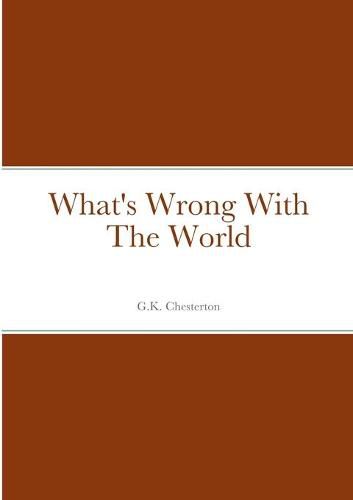Readings Newsletter
Become a Readings Member to make your shopping experience even easier.
Sign in or sign up for free!
You’re not far away from qualifying for FREE standard shipping within Australia
You’ve qualified for FREE standard shipping within Australia
The cart is loading…






This title is printed to order. This book may have been self-published. If so, we cannot guarantee the quality of the content. In the main most books will have gone through the editing process however some may not. We therefore suggest that you be aware of this before ordering this book. If in doubt check either the author or publisher’s details as we are unable to accept any returns unless they are faulty. Please contact us if you have any questions.
What's Wrong With The World By G. K. Chesterton Renewal of interest in the work of GK Chesterton continues apace. The writer whose career began when he dictated his first story to his aunt Rose at the age of three started early and aimed high, and his intellectual development was among the more conspicuously interesting of the Edwardian age. His Orthodoxy of 1908 has become a sort of touchstone text during the present vogue for philosophical theology, much cited by the likes of Slavoj Zizek and the radical theologian John Milbank, while oddball novels such as The Napoleon of Notting Hill (1904) and The Man Who Was Thursday (1908) retain the power to entertain and bemuse in equal measure.This year, however, sees the centenary of one of his rather less high-profile publications. What's Wrong with the World represents an extrapolation of Chesterton's original response to a query posed in so many words by the Times to a selection of eminent writers and thinkers of the day. "Dear Sirs," ran GK's succinct rejoinder, "I am". The publication of the book suggested that, on reflection, there might have been more to say on the subject.The Chesterton offered us by his latter-day biographers and critics is a lost proto-radical, if we could but make him out as such. Along with his close friend Hilaire Belloc, he was the proponent of a species of Third Way politics avant la lettre, a plague-on-both-your-houses confutation of capitalism and socialism known as distributism. Drastically simplified, the vision was of an atomised entrepreneurialism in which as many individuals as possible pursued the goal of profit, so as to wrest capital accumulation from both a few vastly powerful interests (such as "Jewish banking families") and a monolithic socialist state.What's Wrong with the World opens with an analysis of the predicament of modern humanity, too obsessed in the great age of political idealism with visions of the future. Has the Enlightenment ideal of continual social progress been a reality, or has it all been a piece of western myth-making? "Are we still strong enough to spear mammoths, but now tender enough to spare them?" he wonders. But then again, "Does the cosmos contain any mammoth that we have either speared or spared?"What it does contain is the wreckage of half-realised ideals.
$9.00 standard shipping within Australia
FREE standard shipping within Australia for orders over $100.00
Express & International shipping calculated at checkout
This title is printed to order. This book may have been self-published. If so, we cannot guarantee the quality of the content. In the main most books will have gone through the editing process however some may not. We therefore suggest that you be aware of this before ordering this book. If in doubt check either the author or publisher’s details as we are unable to accept any returns unless they are faulty. Please contact us if you have any questions.
What's Wrong With The World By G. K. Chesterton Renewal of interest in the work of GK Chesterton continues apace. The writer whose career began when he dictated his first story to his aunt Rose at the age of three started early and aimed high, and his intellectual development was among the more conspicuously interesting of the Edwardian age. His Orthodoxy of 1908 has become a sort of touchstone text during the present vogue for philosophical theology, much cited by the likes of Slavoj Zizek and the radical theologian John Milbank, while oddball novels such as The Napoleon of Notting Hill (1904) and The Man Who Was Thursday (1908) retain the power to entertain and bemuse in equal measure.This year, however, sees the centenary of one of his rather less high-profile publications. What's Wrong with the World represents an extrapolation of Chesterton's original response to a query posed in so many words by the Times to a selection of eminent writers and thinkers of the day. "Dear Sirs," ran GK's succinct rejoinder, "I am". The publication of the book suggested that, on reflection, there might have been more to say on the subject.The Chesterton offered us by his latter-day biographers and critics is a lost proto-radical, if we could but make him out as such. Along with his close friend Hilaire Belloc, he was the proponent of a species of Third Way politics avant la lettre, a plague-on-both-your-houses confutation of capitalism and socialism known as distributism. Drastically simplified, the vision was of an atomised entrepreneurialism in which as many individuals as possible pursued the goal of profit, so as to wrest capital accumulation from both a few vastly powerful interests (such as "Jewish banking families") and a monolithic socialist state.What's Wrong with the World opens with an analysis of the predicament of modern humanity, too obsessed in the great age of political idealism with visions of the future. Has the Enlightenment ideal of continual social progress been a reality, or has it all been a piece of western myth-making? "Are we still strong enough to spear mammoths, but now tender enough to spare them?" he wonders. But then again, "Does the cosmos contain any mammoth that we have either speared or spared?"What it does contain is the wreckage of half-realised ideals.